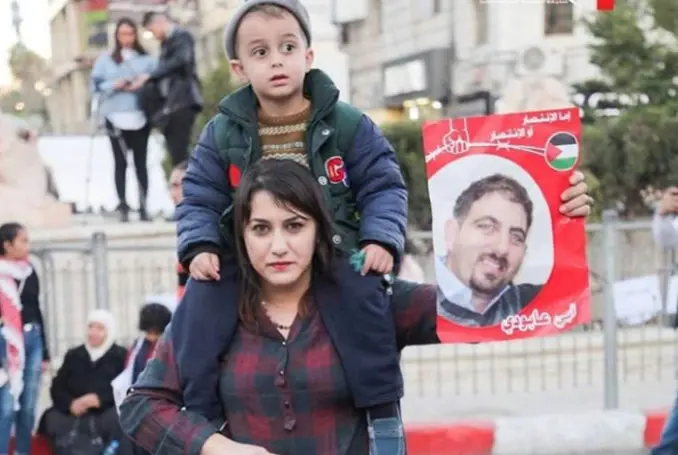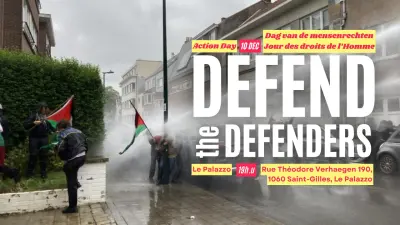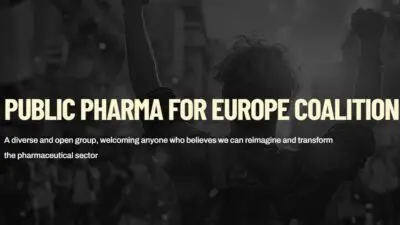Ubai Aboudi: “Solidarity with all peoples resisting oppression bears fruit and is crucial”
On November 14, 2019, we learned that our friend and colleague Ubai Aboudi, Director of the Bisan Center for Research and Development, had been arrested at his home in the middle of the night. In front of his wife and 3 little boys. After 11 months in an Israeli prison, Ubai is free again. Shortly after his release, our colleague Fiona had an interview with him about his experience in prison.
It’s so good to see you Ubai. How are you? How are Hind and the children?
Better than ever. I am full of energy, maybe even more than before I went to prison [Laughing]. I am happy to have found Hind and the children, I missed them terribly. It was very hard for them. Hind has taken on the role of father and mother. She did an incredible job. The children have grown so much. And this experience has left its mark. They follow me everywhere for two weeks now.
What have you done since your release?
First I spent some time with my family, received many visits and calls. Then I quickly returned to Bisan to work. I needed to get up to date and continue to support the important work of the centre with the communities most affected by the consequences of the Israeli occupation.
Did your arrest have an impact on Bisan’s work?
Yes. When I was arrested, we were in discussions with several international organisations or donors to set up development programmes. Some of them were afraid and backed down, preferring not to be linked with Bisan in these circumstances. The occupation said so many horrible and untrue things about me in the newspapers. They accused me of unimaginable things and I had no control over it. We lost a lot of potential financial resources because of this false propaganda. Bisan’s website was also hacked and it took several months to update it.
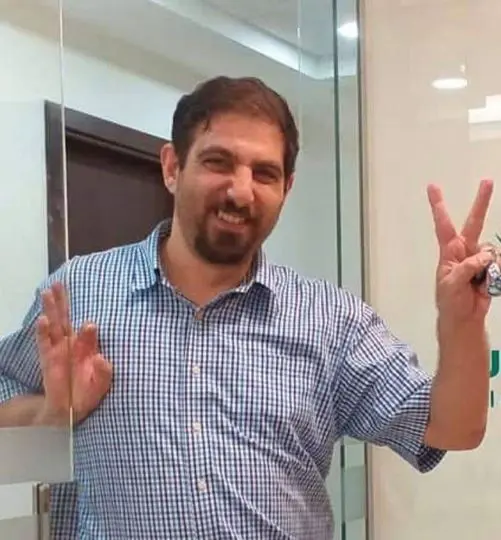
With my arrest and the one of my other colleague Salam the year before, Bisan also faced a serious human resources deficit. Hanan took over as interim director. She has been great and I feel like I’m no longer useful now [Laughing]. I am surrounded by incredible women.
Fortunately, other partners proved to be valuable supporters in the face of the Israeli attacks against me and Bisan. This is the case of Viva Salud which has multiplied its solidarity and has given unfailing support to Bisan and my family. It means a lot to me.
My arrest is part of a strategy of systematic harassment of progressive left-wing voices within the Palestinian social movement. The occupation targets individuals, social organisations and attempts to discredit them and tarnish their reputation with international networks. Israel does not want us to expose the human rights abuses and violations they instigate. Bisan has often been the target of harassment in the past, whether by the occupation, the Palestinian Authority or big business. But this does not prevent us from doing our job: to expose violations of the human rights and socio-economic rights of the Palestinian people.
Can you explain why you were arrested?
I was arrested on the night of 13 November. It was 3 o’clock in the morning when Israeli soldiers knocked on our door. My children were terrified. The soldiers told me that I was under arrest without telling me why and dragged me directly to a military jeep in the street. I barely had time to say goodbye to my family. I stayed for hours in pyjamas, in cold rooms, without eating and without knowing where I was or what was going to happen to me. A few days later, I received the sentence: 3 months of administrative detention.
Can you explain what administrative detention is?
It’s a technique inherited from the British mandate since before 1948. Israel is using it illegally and abusing it through mass arrests of Palestinians on the basis of no known charge, renewable indefinitely. Some prisoners have spent more than 5 years in administrative detention. Worse, some have served more than 20 non-consecutive years without ever knowing why. This technique is used as a means of oppressing the Palestinian people and it is also psychological torture. You never know when you will be arrested or for how long. They want to break the resistance to their system of apartheid and colonisation.
You were not always in administrative detention during your incarceration, there was a trial in May 2020.
That’s right. A real masquerade. I think the shabak – the Israeli internal security services – had to find another way to keep me in prison. Indeed, there was a lot of international pressure and I also have dual Palestinian US citizenship. So they issued charges against me and transferred me to a military court.
In an Israeli military court, you have to prove that you are not guilty. 99.7% of the trials of Palestinians in military courts end in a guilty verdict.
The accusations were pure lies and based on no valid evidence. My lawyer never had access to this evidence to prepare the defense. During the trial, we learned that the only accusations against me were based on torture sessions on other Palestinian prisoners, which is not solid and is intolerable. In Belgium, I believe that a defendant is presumed innocent until proven guilty. In an Israeli military court, you have to prove that you are not guilty. This has nothing to do with a court of law and everything to do with illegality.
When I was in prison, I read the biographies of Nelson Mandela, Malcolm X and Huey Newton, co-founder of the Black panthers party. I felt a powerful connection because, like the black community in the US, Palestinians are not tried and convicted before they are tried. You know you’re going to be found guilty. 99.7% of the trials of Palestinians in military courts end in a guilty verdict.
Can you tell me more about your months in prison?
Prison is both a lot of camaraderie and solidarity but also a huge sense of oppression from a system that tries to dehumanise you. Oppression because the prison system does everything to break you: denial of visits, not enough food, pepper spray, physical beatings, humiliations, confiscation of personal belongings such as photos, denial of education opportunities, no phone calls to family.
The main sense of being in prison is extreme deprivation, mostly for human contact especially with my family. I wasn’t allowed to even touch my wife Hind’s hand because visits are behind glass. Only my children could hug me but only for 10 minutes and only every 60 days. With the coronavirus, some visits were even cancelled, not to mention the sanctions linked to our resistance movement to demand more protection from COVID-19.
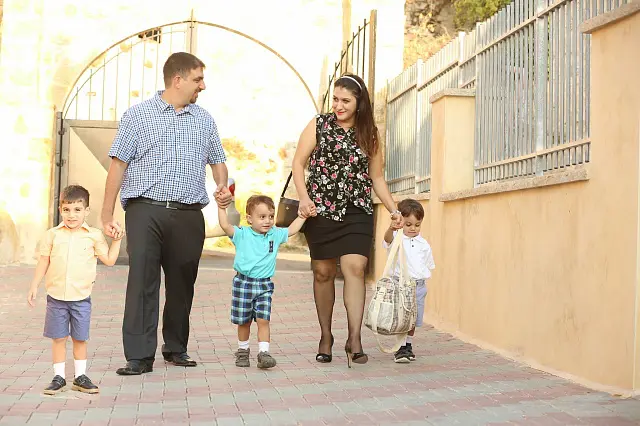
How did you organise yourselves to cope with it?
Solidarity among prisoners is the basis of life in Israeli prisons. Supporting each other, discussing, doing sports, exchanging on readings. We also decided to use education as a means of resistance. Education is forbidden by the prison authorities. However, we always manage to get access to a book or two. We used to do economics or physics lessons with other prisoners, we discussed the history of Palestine. I read Ilan Pappé’s book “The Ethnic Cleansing of Palestine” in prison and we discussed the notion of ethnic cleansing in Palestine. Not only the ‘physical’ cleansing but also the cultural and identity cleansing of the Palestinian people, and the negation of the Palestinian narrative in favor of the Israeli one.
In March, COVID-19 arrived in prison, how did you deal with it?
We were afraid. Personally, I suffer from allergies and I easily catch colds and flu. We lived with 8 prisoners in 3 meter by 12 meter cells. In sections of 70 to 160 prisoners. These living conditions are conducive to the contagion of such a virus and nothing was done to protect us.
We soon learned that a first positive case had been identified in a recently released prisoner. Guards were also absent for long periods of time and we suspected it was because of COVID-19.
We decided to go on a collective hunger strike to have access to tests, to have masks and above all to have respect for the physical distance between the guards and the prisoners. Also to make people talk about the situation of the Palestinian prisoners. In April 2020, many countries released prisoners in advance. This was also the case of Israeli common law prisoners. No Palestinian political prisoners have been released.
Do you think that international solidarity can play an important role for the cause of Palestinian prisoners ?
Yes of course! Solidarity helps to share stories and make visible the abuses and human rights violations against Palestinian prisoners. I think that without international support, I would not have avoided torture… as many other friends have been victims. International solidarity also allows us to hold on. Knowing that petitions were circulating, that people in Belgium, France or the USA were making public appeals for my release, putting pressure on their governments, it means a lot to me. Thank you very much. Thank you with all my heart.
Beyond the cause of our prisoners, I strongly believe that solidarity with all peoples resisting oppression around the world bears fruit and is crucial.
What do you take away from the 11 months in prison?
I am more convinced than ever of the importance of creating international connections and fighting together against systems of economic, political, cultural and social oppression.
As a people, we are the majority. We are the 99%. In Iran, Iraq, India, the Philippines, Colombia and all over the world. This system of oppression benefits only the small remaining 1%. This cannot last and together the 99% can reverse the trend, can bring about values of solidarity, sharing, equality, democracy and justice. We must remain vigilant and always keep this long-term goal in mind.
All the power to the people, people have the power
